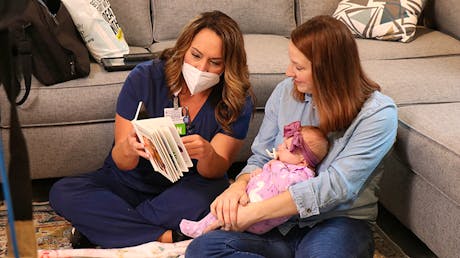After 30 Years, New Mothers Study Sparks New Discoveries
By Gianluca D'Elia
Tuesday, January 16, 2024
 It has been over 30 years since Harriet Kitzman, PhD, RN, FAAN, former senior associate dean of research, first studied the impact of nurse visits on new moms and their children.
It has been over 30 years since Harriet Kitzman, PhD, RN, FAAN, former senior associate dean of research, first studied the impact of nurse visits on new moms and their children.
The New Mothers Study in Memphis, Tennessee, was a randomized controlled trial that began in 1990. Now, as researchers collect data once again, the longitudinal study continues to spark new discoveries and offer insights into how this nurse intervention continues to affect women and their children who participated in the original trial.
A collaborative effort with developmental psychologist David Olds, PhD, the Memphis trial was one of three seminal studies that provided the evidence base for the Nurse Family Partnership (NFP), which provides prenatal and infant home visits to low-income mothers expecting a first child. It has been implemented and disseminated nationally and globally, and is now a federally funded initiative that serves nearly 40,000 families.
As a pediatric nurse who engaged in home visits in the 1960s, Kitzman saw the impact of home visits firsthand, inspiring her to connect with Olds, who had implemented a randomized controlled trial using nurse visits with first time mothers in rural Chemung County, New York in the late 1970s. Olds left the University in 1994, but Kitzman continued to collaborate with him, and maintained the infrastructure at the School of Nursing to continue to center study activities at the school.
Evelyn Collins, a social worker who has served as the project coordinator since the inception of the study, follows hundreds of Memphis mothers and their first-born children who participated in the New Mothers Study, along with her team.
 Collins’ remarkable relationship-building skills and connection to the community are central to the study’s high retention rate among families who have been participating since 1990.
Collins’ remarkable relationship-building skills and connection to the community are central to the study’s high retention rate among families who have been participating since 1990.
“This is my calling,” Collins said, reflecting on more than 30 years as part of the ongoing trial. “Nurses are like second moms to the participants. People want to get in touch with them, and nurses wonder about how participants are doing. The nurses offer women help navigating human services, show them how to ride the bus, how to make toys, how to be good parents, and overall, good people.”
Collins and her colleagues from the School of Nursing aren’t done yet. For the past three years, they have been collecting data in a 30-year follow-up with the families who were enrolled in the New Mothers Study to assess if the original intervention has influenced the health and well-being of the mothers and their firstborn children, given that the intervention occurred during a critical stage of life: pregnancy and early childhood.
Now in the fourth and final year of collection, Professor Susan Groth, PhD, WHNP-BC, FAANP, and Assistant Professors Elizabeth Anson, PhD, and Joyce Smith, PhD, ANP, are preparing to work with colleagues in Colorado to analyze this new data. Leading up to this 30-year milestone, however, the study has already offered a wealth of insights on maternal and child health.“
The legacy of Harriet Kitzman’s work is broad,” Groth said. “The data is rich and beautiful, and it continues to lend itself to answering new research questions raised by faculty and students.”
Data from the New Mothers Study has played a crucial role in the work of several researchers, including both Groth and Anson: Groth studied gestational weight gain and its long-term effects, and Anson assessed physical aggression among children and its connection to violence later in life.
The continued contributions of these data to new discoveries would not surprise Kitzman if she were here today.
“The investment that society can make at this critical stage in a woman's life pays off over the long run in many ways,” she once said in an interview about the New Mothers Study more than 20 years ago.
Evidence shows that nurse home visits lead to healthier pregnancies, improve the health and development of children, and help at-risk families improve their self-sufficiency. For Groth, the expansion of the New Mothers Study, along with two other seminal trials Kitzman was engaged in, to the establishment of the Nurse Family Partnership is an incredible testimony to what makes nurses’ roles unique, both in patient care and research.
“Nurses take a holistic approach to health and research; we don’t compartmentalize,” Groth said. “We assess a person’s environment, family, and relationships in practice, and in research we do the same thing: we consider the biological and behavioral cues we're taught to pick up on and integrate them into everything we do.”
Categories: Research

